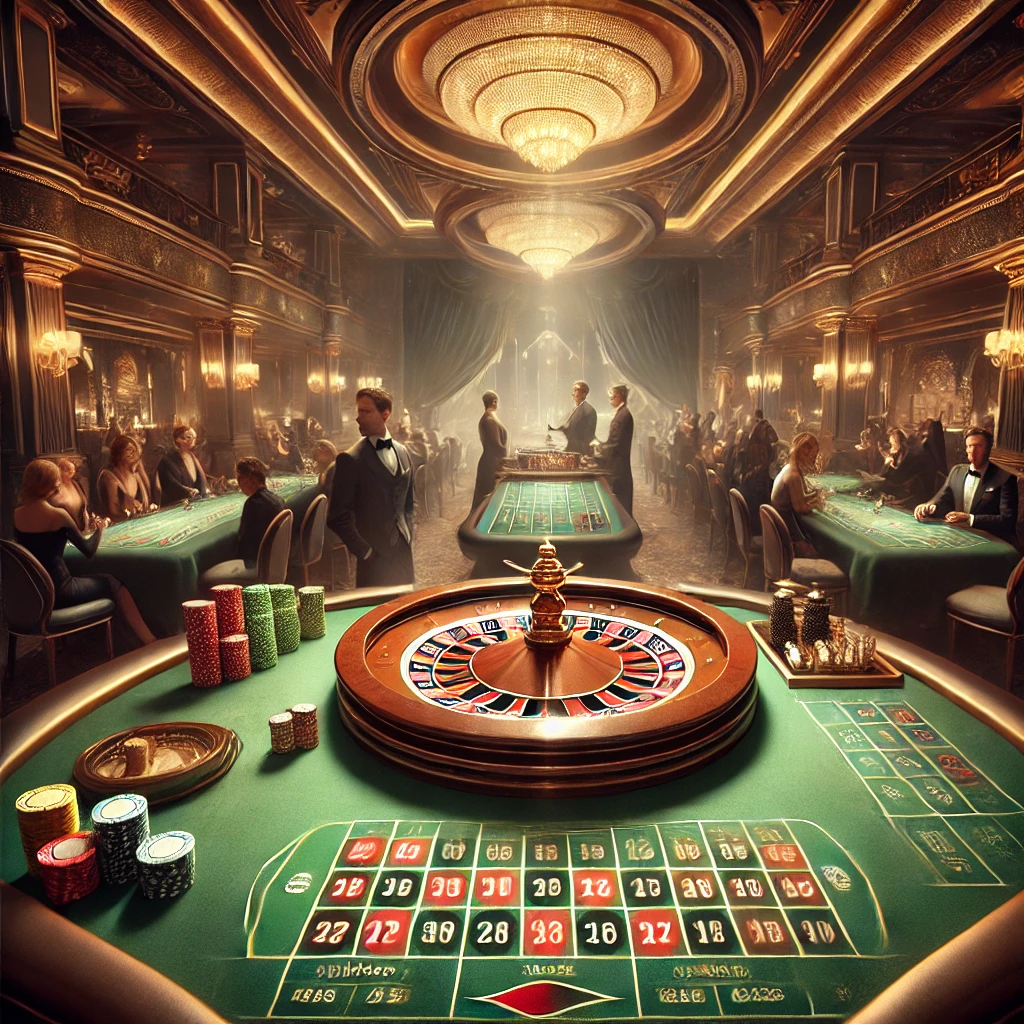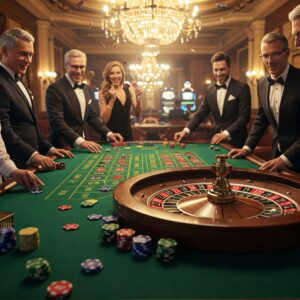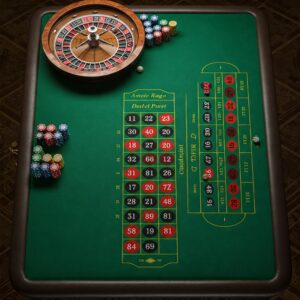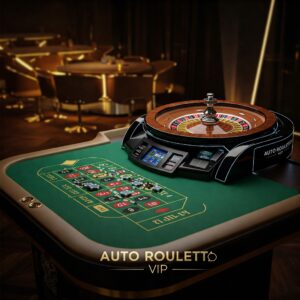
Roulette, a game synonymous with glamour and chance, has captivated players for centuries. Its origins trace back to 18th-century France, where it was first introduced as a blend of existing games like Roly-Poly and Even-Odd. Over time, roulette evolved into the sophisticated game we know today, with its iconic wheel and table layout. Despite the advent of modern casino games, roulette remains a staple in both land-based and online casinos, offering a unique blend of simplicity and excitement.
Table of Contents
ToggleUnderstanding the Roulette Wheel
At the heart of roulette lies the wheel, a marvel of engineering and design. The wheel consists of numbered pockets, alternating between red and black, with a single green pocket for the zero (and an additional double zero in American roulette). The European wheel features 37 pockets, while the American version has 38, giving the latter a slightly higher house edge. The ball, typically made of ivory or plastic, is spun in the opposite direction of the wheel, eventually landing in one of the numbered pockets, determining the winning number.
The Roulette Table Layout
The roulette table is a meticulously designed grid that allows players to place their bets. Inside bets and outside bets are the two primary divisions of the betting area. Inside bets, which offer larger rewards but fewer chances of winning, are put on certain numbers or small groupings of numbers. Outside bets, on the other hand, cover larger groups of numbers, such as red or black, odd or even, or high or low numbers, providing better odds but smaller payouts. The croupier, or dealer, oversees the game, spinning the wheel, managing bets, and distributing winnings.
Types of Roulette Games
Roulette comes in several variations, each with its own unique rules and house edge. European roulette, with its single zero, is the most player-friendly version, offering a house edge of 2.7%. American roulette, with its additional double zero, increases the house edge to 5.26%. French roulette, similar to the European version, includes the “La Partage” and “En Prison” rules, which can further reduce the house edge on even-money bets. Mini roulette, a scaled-down version of the game, features only 13 pockets, offering a different experience for players.
The House Edge in Roulette
The house edge is a crucial concept in roulette, representing the casino’s advantage over the player. In European roulette, the house edge is 2.7%, while in American roulette, it jumps to 5.26% due to the additional double zero. French roulette, with its special rules, can reduce the house edge to as low as 1.35% on even-money bets. Understanding the house edge is essential for players looking to maximize their chances of winning, as it directly impacts the long-term profitability of the game.
Roulette Betting Strategies
Many players employ betting strategies in an attempt to beat the house. The Martingale system, one of the most well-known strategies, involves doubling your bet after each loss, aiming to recover all previous losses with a single win. The Fibonacci system, based on the Fibonacci sequence, involves increasing your bet according to the sequence after each loss. The D’Alembert system, a more conservative approach, involves increasing or decreasing your bet by one unit after each loss or win. The Labouchere system, also known as the cancellation system, involves creating a sequence of numbers and betting the sum of the first and last numbers in the sequence, crossing them off after a win.
The Role of Probability in Roulette
Probability plays a central role in roulette, determining the likelihood of each outcome. Each spin of the wheel is an independent event, meaning that the outcome of one spin does not influence the outcome of the next. The Law of Large Numbers states that as the number of spins increases, the actual results will converge towards the expected probabilities. Understanding probability can help players make informed betting decisions, although it’s important to remember that roulette is ultimately a game of chance.
The Psychology of Roulette
One intriguing feature of roulette is its psychology. The Gambler’s Fallacy, the belief that past outcomes influence future results, is a common cognitive bias among players. While some players rely on luck, others believe in skill-based strategies, although roulette is predominantly a game of chance. Emotions can also play a significant role, with players often experiencing a rush of adrenaline during the game, which can influence their decision-making.
Roulette in Popular Culture
Roulette has made numerous appearances in popular culture, often symbolizing risk and chance. Iconic movies like “Casablanca” and “Diamonds Are Forever” feature memorable roulette scenes, while literature has also explored the game’s allure. Roulette’s presence in popular culture has contributed to its enduring appeal, making it a symbol of the casino experience.
Online Roulette vs. Land-Based Roulette

The rise of online casinos has brought roulette to a wider audience, offering players the convenience of playing from home. Online roulette often features lower minimum bets and a wider variety of game options, including live dealer games. However, land-based roulette offers a unique social experience, with the atmosphere of a real casino adding to the excitement. Both formats have their own advantages, and many players enjoy both.
Live Dealer Roulette
Live dealer roulette bridges the gap between online and land-based casinos, offering a real-time gaming experience with a human dealer. Players can interact with the dealer and other players, creating a more immersive experience. The technology behind live dealer games has advanced significantly, with high-definition streaming and multiple camera angles enhancing the gameplay. Live dealer roulette is expected to continue growing in popularity, offering a blend of convenience and authenticity.
Roulette Variants and Innovations
In addition to the classic versions of roulette, many casinos offer innovative variants to keep the game fresh and exciting. Multi-wheel roulette allows players to bet on multiple wheels simultaneously, increasing the action and potential payouts. Speed roulette reduces the time between spins, catering to players who prefer a faster pace. Immersive roulette, with its advanced graphics and multiple camera angles, offers a more engaging experience, bringing the excitement of the casino floor to your screen.
The Mathematics Behind Roulette
The mathematics of roulette is both complex and fascinating. The physics of the wheel, including the speed of the ball and the friction of the wheel, play a role in determining the outcome. In online roulette, Random Number Generators (RNGs) ensure that each spin is independent and fair. Betting systems, while popular, are ultimately based on probability and cannot overcome the house edge. Understanding the mathematics behind roulette can help players make more informed decisions, although luck remains the dominant factor.
Roulette Etiquette
Proper etiquette is essential when playing roulette, whether in a land-based or online casino. At the table, it’s important to be respectful to the dealer and other players, avoiding disruptive behavior. Tipping the croupier is customary, especially after a big win. Common mistakes, such as touching your chips after the ball has been spun, should be avoided to ensure a smooth and enjoyable experience for everyone.
Famous Roulette Wins and Losses

Roulette has seen its share of legendary wins and losses. Some players have walked away with life-changing sums, while others have suffered devastating losses. These stories often serve as cautionary tales, highlighting the importance of responsible gambling. While big wins can be exhilarating, it’s important to remember that roulette is a game of chance, and losses are an inherent part of the experience.
Roulette and Responsible Gambling
Responsible gambling is crucial when playing roulette. Setting limits on time and money spent can help prevent problem gambling. Recognizing the signs of gambling addiction, such as chasing losses or neglecting responsibilities, is essential. Many resources are available for those who need help, including hotlines and support groups. By gambling responsibly, players can enjoy roulette without risking their financial or emotional well-being.
The Future of Roulette
The future of roulette is likely to be shaped by technological advancements. Virtual Reality (VR) has the potential to revolutionize the game, offering an even more immersive experience. Online casinos are expected to continue innovating, with new variants and features keeping the game fresh and exciting. As technology evolves, roulette will likely remain a popular choice for players, combining tradition with innovation.
Roulette Myths and Misconceptions
Roulette is surrounded by myths and misconceptions, many of which can lead to poor betting decisions. The idea of “hot” and “cold” numbers, for example, is a common misconception, as each spin is independent. The Gambler’s Fallacy, the belief that past outcomes influence future results, is another myth that can lead to irrational betting. By debunking these myths, players can approach the game with a clearer understanding of its mechanics.
Roulette Tournaments and Competitions
Roulette tournaments offer a unique way to enjoy the game, with players competing against each other for prizes. These tournaments often have specific rules and formats, adding an extra layer of excitement. Famous roulette tournaments, such as those held in Monte Carlo, attract players from around the world. Tips for competing in roulette tournaments include managing your bankroll carefully and staying focused under pressure.
Conclusion: The Timeless Appeal of Roulette

Roulette’s enduring appeal lies in its perfect balance of chance and strategy. Whether you’re a seasoned player or a newcomer, the game offers something for everyone. Its rich history, combined with the thrill of each spin, ensures that roulette will continue to captivate players for generations to come. As you step up to the table, remember that roulette is a game of chance, and the most important thing is to enjoy the experience.
